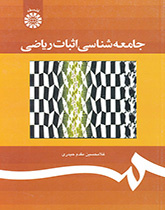
Sociology of Mathematical Proof
This book has two very impressive and praiseworthy features. First, its subject is one of the emerging subjects and the forefront of contemporary sociological and philosophical thought. In this common border between sociology and philosophy, there are still no accepted basics and principles, and genuine research are very few. This situation reveals a wide range of difficulties and unevenness that the author has entered boldly and, of course, cautiously. Another prominent feature of the book is the author’s thoughtful and non-imitative approach to the subject he is exploring. Regardless of what criticisms can be made of the book or any other person in the detailed critique of the book, the emergence of such innovative research in the highly modernist-scientific atmosphere of contemporary Iranian intellectual society is a novel, hopeful and deserving event and highly admired. Outside the mathematical community, there is often the dogmatic notion that the process of proof in mathematics is an absolute and stable concept, independent of the requirements of time and place, personal and group tastes, and the evolution of human knowledge over the centuries. Although there is more consensus in mathematics than on other branches of human knowledge about the validity of existing rules, the concept of proof has undergone historical changes and is involved in serious philosophical, educational, and sociological considerations. This book tries to draw the reader’s attention to the existence of controversy in this field, and therefore, regardless of the author’s opinion about the details of the text, it is a positive step in acquainting the reader with one of the important topics in the philosophy of mathematics.
Highly-Praised in the 16th University Student Book of the Year Award




